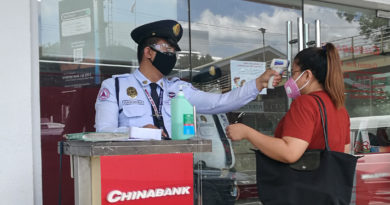5 Checking Account Boo-Boos
By Carlos Gonzales
Using a checking account is a convenient way of paying bills like credit cards and tuition. Just write a check and there you go. But if you’re not careful, you may be needlessly making your bank richer (and yourself poorer). So what are the five common mistakes you can make with a checking account? And what can you do to avoid them?
Boo-boo #1: Bouncing checks
Why it’s wrong: This is a very costly mistake, as you will be charged not just a fixed fee but also an additional fee per day. If you fund a temporary overdraft, i.e. it’s honored, one major commercial bank charges P1,000 plus P200 per P40,000 per day. If your check is returned, the fee is P2,000 plus P200 per P40,000 per day. If you keep on forgetting to fund your account sufficiently, this will really hurt. And if you let your checks bounce, you’re going to get yourself in trouble.
What to do: Stay on top of your account balance. Many banks provide tools that will help you be updated anytime. You can check your balance online or even via SMS. Or simply call your branch or the call center. If you need to issue a check quickly and you don’t have time to check your balance, see if you can post-date it a few days to give you time to fund your account.
Boo-boo #2: Using an ATM
Why it’s wrong: While it may be convenient having a checking account with an ATM card (you can issue checks and withdraw cash from an ATM), this can also cause a lot of headaches. For one, it’s a lot harder to monitor your transactions. If you have the habit of making withdrawals from other banks, say twice a week, at P10 per withdrawal and a peso per inquiry, you would have unknowingly spent P88 in a month, or P1,056 in a year.
What to do: If you really want an ATM to go with your checking account, plan your withdrawals ahead so you only withdraw from your bank’s ATMs. Better yet, just hide the card in your drawer and just use it for real emergencies. If you have a regular savings account with an ATM, e.g. a payroll account, use that as your main ATM account. And open a checking account with a good old fashioned passbook, not with an ATM and a monthly statement.
Boo-boo #3: Not balancing your check book
Why it’s wrong: The old-school way of balancing a check book is manually writing on the register the amount whenever you issue a check, make a deposit, earn interest, or are charged fees or withholding tax, and making a running balance. That should sound fun for a CPA but not for you. If you’re not as diligent and patient in recording transactions, you will make mistakes.
What to do: A better alternative is to sign up for online banking and check your balance – automatically updated – almost in real-time (there are cut-off times for system updates).
Boo-boo #4: Overfunding your account
Why it’s wrong: If you don’t have enough money in your account, you’re in danger of overdraft. If you let your balance get depleted below the minimum average daily balance, you can be charged a service fee of P200 to P500 per month. The other extreme is overfunding your account. Most regular checking accounts don’t pay interest and those that do pay just a fraction of a percent that it doesn’t make any sense to keep more than you need. You’d think it doesn’t cost you anything but it does – in opportunity cost. Instead of sleeping in your checking account, your money could be earning more – a lot more – in a time deposit or mutual fund.
What to do: Don’t park your excess funds in your checking account. Proper planning of monthly expenses that you’ll use checks for should allow you to keep just enough money in your account. Remember that your checking account should be purely a transactional account to be used for paying expenses.
Boo-boo #5: Getting careless
Why it’s wrong: Checks are also a favorite tool of scammers. Some common ways your checking account can be misused are signature forgery, tampering of an issued check, and outright counterfeiting. Your account can be wiped out and even be charged for overdrawn checks (by the thief).
What to do: It would be nice if you have a signature that’s not easy to forge for starters. Otherwise, just make it a point to be extra careful: don’t pay to cash, keep your check book in a secure place, don’t leave blank checks lying around, fill out all lines, and monitor your account online for suspicious transactions. If you discover your check or check book has been stolen, call your bank immediately and request a stop payment.




thanks for the info you’ve posted, there is just so much info out there and this is such a tiresome topic to research 🙁